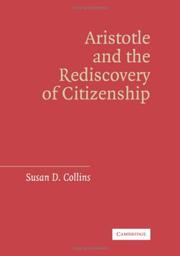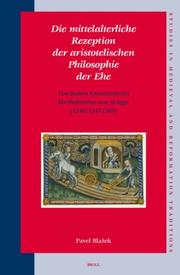| Listing 1 - 4 of 4 |
Sort by
|

ISBN: 0521860466 9780521860468 0511225776 9780511225772 9780511226342 0511226349 0511224486 9780511224485 0511225156 9780511225154 1107167639 1280541512 0511498632 0511317867 0521110211 9780511498633 9780521110211 Year: 2006 Publisher: Cambridge ; New York : Cambridge University Press,
Abstract | Keywords | Export | Availability | Bookmark
 Loading...
Loading...Choose an application
- Reference Manager
- EndNote
- RefWorks (Direct export to RefWorks)
Aristotle and the Rediscovery of Citizenship confronts a question that is central to Aristotle's political philosophy as well as to contemporary political theory: what is a citizen? Answers prove to be elusive, in part because late twentieth-century critiques of the Enlightenment called into doubt fundamental tenets that once guided us. Engaging the two major works of Aristotle's political philosophy, his Nicomachean Ethics and his Politics, Susan D. Collins poses questions that current discussions of liberal citizenship do not adequately address. Drawing a path from contemporary disputes to Aristotle, she examines in detail his complex presentations of moral virtue, civic education, and law; his view of the aims and limits of the political community; and his treatment of the connection between citizenship and the human good. Collins thereby shows how Aristotle continues to be an indispensable source of enlightenment, as he has been for political and religious traditions of the past.
Citizenship --- Philosophy. --- Aristotle --- Political and social views. --- Philosophy --- Aristoteles --- Aristote --- Aristotile --- Arisṭāṭṭil --- Aristo, --- Aristotel --- Aristotele --- Aristóteles, --- Aristòtil --- Arisṭū --- Arisṭūṭālīs --- Arisutoteresu --- Arystoteles --- Ya-li-shih-to-te --- Ya-li-ssu-to-te --- Yalishiduode --- Yalisiduode --- Ἀριστοτέλης --- Αριστοτέλης --- Аристотел --- ארסטו --- אריםטו --- אריסטו --- אריסטוטלס --- אריסטוטלוס --- אריסטוטליס --- أرسطاطاليس --- أرسططاليس --- أرسطو --- أرسطوطالس --- أرسطوطاليس --- ابن رشد --- اريسطو --- Pseudo Aristotele --- Pseudo-Aristotle --- アリストテレス --- Political philosophy. Social philosophy --- Arts and Humanities --- Citizenship - Philosophy. --- Aristotle - Political and social views.
Book
ISBN: 2251662359 2821828845 2251672354 9782251662350 Year: 1983 Volume: fasc. 235 Publisher: Presses universitaires de Liège
Abstract | Keywords | Export | Availability | Bookmark
 Loading...
Loading...Choose an application
- Reference Manager
- EndNote
- RefWorks (Direct export to RefWorks)
Ethics, Ancient --- Ancient ethics --- Aristotle --- Aristoteles --- Aristote --- Aristotile --- Ethics. --- Political and social views. --- Political philosophy. Social philosophy --- General ethics --- Morale ancienne --- Political and social views --- Ethics --- Ethics, Ancient. --- Arisṭāṭṭil --- Aristo, --- Aristotel --- Aristotele --- Aristóteles, --- Aristòtil --- Arisṭū --- Arisṭūṭālīs --- Arisutoteresu --- Arystoteles --- Ya-li-shih-to-te --- Ya-li-ssu-to-te --- Yalishiduode --- Yalisiduode --- Ἀριστοτέλης --- Αριστοτέλης --- Аристотел --- ארסטו --- אריםטו --- אריסטו --- אריסטוטלס --- אריסטוטלוס --- אריסטוטליס --- أرسطاطاليس --- أرسططاليس --- أرسطو --- أرسطوطالس --- أرسطوطاليس --- ابن رشد --- اريسطو --- Pseudo Aristotele --- Pseudo-Aristotle --- アリストテレス --- Philosophie politique. --- Morale politique. --- Aristote, --- Science politique --- Morale --- Aristotle - Political and social views --- Aristotle - Ethics --- philosophie politique --- aristotélisme --- philosophie antique --- éthique
Book
ISBN: 1282399470 9786612399473 9047442415 9789047442417 9004168745 9789004168749 Year: 2007 Publisher: Leiden ; Boston : Brill,
Abstract | Keywords | Export | Availability | Bookmark
 Loading...
Loading...Choose an application
- Reference Manager
- EndNote
- RefWorks (Direct export to RefWorks)
This study is the first comprehensive treatment of the way Marsilius of Padua (1270/1290–1342), a seminal political thinker of the Late Middle Ages, elaborated on Aristotle’s political thought in articulating his political theory. Its main thesis is that Marsilius is committed to the view of a sharp disjunction between ethics and politics, thus deviating radically not only from Aristotle, but also from the majority of medieval Commentators of Aristotle such as Thomas Aquinas, Giles of Rome, Peter of Auvergne and John of Jandun. From a methodological viewpoint, it follows the model of “concentric circles”: its starting point is a detailed comparison of the main ideas of the Defensor pacis ( Defender of Peace ) (1324), Marsilius’ opus magnum , on the one hand, and Marsilius' quotations from William of Moerbeke’s Latin translations of Aristotle’s works focusing in particular on the Politics , the Nicomachean Ethics , the Rhetoric and the Metaphysics as well as the Greek original, on the other. This method of exploring the use of classics in medieval political thought challenges the notion of “reception” as conceived of by recent research and brings out a number of crucial differences between Marsilius and Aristotle. Further, this study situates Marsilius’ ideas in the history of late medieval political thought (podestà literature et cetera), the political realities that obtained in 14th-century Padua and late medieval debates on the fortunes of the communal regime and on the rise of the signoria (e.g. Albertino Mussato). It also argues against Marsilius’ so-called Averroism and identifies Moses Maimonides’ Guide of the Perplexed as a potential source of the Defensor pacis .
Politische Philosophie --- Philosophy, Medieval. --- Political science --- Medieval philosophy --- Scholasticism --- State, The --- History. --- History of theories --- Marsilius (de Padua) --- Aristotle --- Marsilius, --- Aristoteles --- Aristote --- Arisṭāṭṭil --- Aristo, --- Aristotel --- Aristotele --- Aristóteles, --- Aristòtil --- Aristotile --- Arisṭū --- Arisṭūṭālīs --- Arisutoteresu --- Arystoteles --- Ya-li-shih-to-te --- Ya-li-ssu-to-te --- Yalishiduode --- Yalisiduode --- Ἀριστοτέλης --- Αριστοτέλης --- Аристотел --- ארסטו --- אריםטו --- אריסטו --- אריסטוטלס --- אריסטוטלוס --- אריסטוטליס --- أرسطاطاليس --- أرسططاليس --- أرسطو --- أرسطوطالس --- أرسطوطاليس --- ابن رشد --- اريسطو --- Pseudo Aristotele --- Pseudo-Aristotle --- アリストテレス --- Political and social views. --- Political science - History --- Philosophy, Medieval --- Marsilius, - of Padua, - d. 1342? - Defensor pacis --- Aristotle - Political and social views

ISSN: 15734188 ISBN: 9004154132 9789004154131 9786611400729 1281400726 9047411102 9789047411109 9781281400727 6611400729 Year: 2007 Volume: 117 Publisher: Leiden ; Boston : Brill,
Abstract | Keywords | Export | Availability | Bookmark
 Loading...
Loading...Choose an application
- Reference Manager
- EndNote
- RefWorks (Direct export to RefWorks)
This study considers the medieval reception of Aristotle’s philosophy of marriage, which became known in the Medieval West through the thirteenth century rediscovery of the Nicomachean Ethics, the Politics and the pseudo-Aristotelian Economics, then considered a genuine work of the Stagirite. The author shows in seven case studies how medieval readers interpreted the ideas on marriage contained in these Aristotelian texts, and how they used them to construct their own, mostly theological or philosophical, discourses on marriage. At the core stands a hitherto largely neglected, unedited commentary on the pseudo-Aristotelian Economics of Bartholomew of Bruges (1309). This study is an important contribution to research on the medieval reception of Aristotle, as well as on the history of marriage.
Marriage --- Marriage customs and rites, Medieval. --- Aristotle --- History --- Political and social views. --- -Marriage customs and rites, Medieval --- 1 <38> ARISTOTELES --- 392.4/.5 --- Medieval marriage customs and rites --- Married life --- Matrimony --- Nuptiality --- Wedlock --- Love --- Sacraments --- Betrothal --- Courtship --- Families --- Home --- Honeymoons --- Griekse filosofie--ARISTOTELES --- Verloving. Huwelijk. Huwelijksgebruiken. Partnerkeuze. Polyandrie. Polygamie. Monogamie --- Aristoteles --- 392.4/.5 Verloving. Huwelijk. Huwelijksgebruiken. Partnerkeuze. Polyandrie. Polygamie. Monogamie --- 1 <38> ARISTOTELES Griekse filosofie--ARISTOTELES --- Aristote --- Aristotile --- Marriage customs and rites, Medieval --- Arisṭāṭṭil --- Aristo, --- Aristotel --- Aristotele --- Aristóteles, --- Aristòtil --- Arisṭū --- Arisṭūṭālīs --- Arisutoteresu --- Arystoteles --- Ya-li-shih-to-te --- Ya-li-ssu-to-te --- Yalishiduode --- Yalisiduode --- Ἀριστοτέλης --- Αριστοτέλης --- Аристотел --- ארסטו --- אריםטו --- אריסטו --- אריסטוטלס --- אריסטוטלוס --- אריסטוטליס --- أرسطاطاليس --- أرسططاليس --- أرسطو --- أرسطوطالس --- أرسطوطاليس --- ابن رشد --- اريسطو --- Pseudo Aristotele --- Pseudo-Aristotle --- アリストテレス --- History. --- Marriage - History - Europe. --- Aristotle - Political and social views.
| Listing 1 - 4 of 4 |
Sort by
|

 Search
Search Feedback
Feedback About UniCat
About UniCat  Help
Help News
News